| Listing 1 - 9 of 9 |
Sort by
|
Book
ISBN: 9781849731485 1849731489 Year: 2013 Publisher: Cambridge: Royal Society of Chemistry,
Abstract | Keywords | Export | Availability | Bookmark
 Loading...
Loading...Choose an application
- Reference Manager
- EndNote
- RefWorks (Direct export to RefWorks)
Ordinateurs moléculaires --- Chimiométrie --- Informatique --- Photochimie --- Chimie supramoléculaire --- Chemometrics --- Molecular computers
Book
ISBN: 9782746215160 2746215160 Year: 2007 Publisher: Paris: Hermès science publications, Lavoisier,
Abstract | Keywords | Export | Availability | Bookmark
 Loading...
Loading...Choose an application
- Reference Manager
- EndNote
- RefWorks (Direct export to RefWorks)
Ubiquitous computing --- Nanotechnology --- Molecular computers --- Quantum computers --- Informatique omniprésente --- Nanotechnologie --- Ordinateurs moléculaires --- Ordinateurs quantiques --- Nanoelectronics --- Microprocessors --- Informatique omniprésente --- Ordinateurs moléculaires
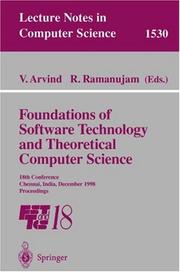
ISSN: 03029743 ISBN: 3540653848 9783540653844 3540493824 Year: 1998 Volume: 1530 Publisher: Berlin: Springer,
Abstract | Keywords | Export | Availability | Bookmark
 Loading...
Loading...Choose an application
- Reference Manager
- EndNote
- RefWorks (Direct export to RefWorks)
Evolutionary programming (Computer science) --- Quantum computers --- Molecular computers --- Programmation évolutive --- Ordinateurs quantiques --- Ordinateurs moléculaires --- Congresses --- Programming Languages, Compilers, Interpreters. --- Computer software --- Electronic data processing --- Computer science. --- Software engineering. --- Programming languages (Electronic computers). --- Computers. --- Computer science --- Computer Science. --- Theory of Computation. --- Software Engineering. --- Discrete Mathematics in Computer Science. --- Mathematics. --- Information theory. --- Computational complexity. --- Complexity, Computational --- Machine theory --- Informatics --- Science --- Computer software engineering --- Engineering --- Communication theory --- Communication --- Cybernetics --- Computer science—Mathematics. --- Computer languages --- Computer program languages --- Computer programming languages --- Machine language --- Languages, Artificial --- Automatic computers --- Automatic data processors --- Computer hardware --- Computing machines (Computers) --- Electronic brains --- Electronic calculating-machines --- Electronic computers --- Hardware, Computer --- Computer systems --- Calculators --- Cyberspace --- Molecular computers. --- Computer software. --- Software, Computer --- DNA-based computers --- DNA computers --- Biocomputers --- Natural computation --- Evolutionary programming (Computer science) - Congresses --- Quantum computers - Congresses --- Molecular computers - Congresses --- Programmation évolutive - Congrès --- Ordinateurs quantiques - Congrès --- Ordinateurs moléculaires - Congrès
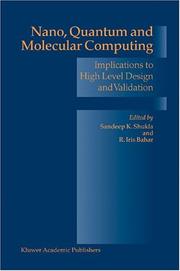
ISBN: 9781402080678 1402080670 9781402080685 1402080689 Year: 2004 Publisher: Boston, Massachusetts : Kluwer Academic Publishers,
Abstract | Keywords | Export | Availability | Bookmark
 Loading...
Loading...Choose an application
- Reference Manager
- EndNote
- RefWorks (Direct export to RefWorks)
One of the grand challenges in the nano-scopic computing era is guarantees of robustness. Robust computing system design is confronted with quantum physical, probabilistic, and even biological phenomena, and guaranteeing high reliability is much more difficult than ever before. Scaling devices down to the level of single electron operation will bring forth new challenges due to probabilistic effects and uncertainty in guaranteeing 'zero-one' based computing. Minuscule devices imply billions of devices on a single chip, which may help mitigate the challenge of uncertainty by replication and redundancy. However, such device densities will create a design and validation nightmare with the shear scale. The questions that confront computer engineers regarding the current status of nanocomputing material and the reliability of systems built from such miniscule devices, are difficult to articulate and answer. We have found a lack of resources in the confines of a single volume that at least partially attempts to answer these questions. We believe that this volume contains a large amount of research material as well as new ideas that will be very useful for some one starting research in the arena of nanocomputing, not at the device level, but the problems one would face at system level design and validation when nanoscopic physicality will be present at the device level.
Quantum computers. --- Molecular computers. --- Nanotechnology. --- Ordinateurs quantiques --- Ordinateurs moléculaires --- Nanotechnologie --- Computer aided design. --- Computer engineering. --- Computer science. --- Information theory. --- Systems engineering. --- Quantum computers --- Molecular computers --- Nanotechnology --- Technology - General --- Computer Science --- Engineering & Applied Sciences --- Ordinateurs moléculaires --- EPUB-LIV-FT SPRINGER-B --- Computers. --- Computer-aided engineering. --- Electrical engineering. --- Electronic circuits. --- Computer Science. --- Theory of Computation. --- Circuits and Systems. --- Computer-Aided Engineering (CAD, CAE) and Design. --- Electrical Engineering. --- Electric engineering --- Engineering --- CAE --- Electron-tube circuits --- Electric circuits --- Electron tubes --- Electronics --- Automatic computers --- Automatic data processors --- Computer hardware --- Computing machines (Computers) --- Electronic brains --- Electronic calculating-machines --- Electronic computers --- Hardware, Computer --- Computer systems --- Cybernetics --- Machine theory --- Calculators --- Cyberspace --- Data processing --- DNA-based computers --- DNA computers --- Biocomputers --- Natural computation --- Molecular technology --- Nanoscale technology --- High technology --- Computers
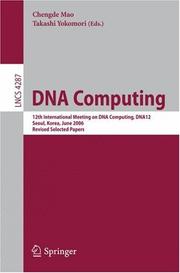
ISSN: 03029743 ISBN: 9783540490241 3540490248 3540684239 Year: 2006 Volume: 4287 Publisher: Berlin: Springer,
Abstract | Keywords | Export | Availability | Bookmark
 Loading...
Loading...Choose an application
- Reference Manager
- EndNote
- RefWorks (Direct export to RefWorks)
Molecular computers --- Ordinateurs moléculaires --- Congresses. --- Congrès --- Computer Science --- Engineering & Applied Sciences --- Computer science. --- Computers. --- Algorithms. --- Artificial intelligence. --- Bioinformatics. --- Computer Science. --- Computation by Abstract Devices. --- Algorithm Analysis and Problem Complexity. --- Computational Biology/Bioinformatics. --- Artificial Intelligence (incl. Robotics). --- Bio-informatics --- Biological informatics --- Biology --- Information science --- Computational biology --- Systems biology --- AI (Artificial intelligence) --- Artificial thinking --- Electronic brains --- Intellectronics --- Intelligence, Artificial --- Intelligent machines --- Machine intelligence --- Thinking, Artificial --- Bionics --- Cognitive science --- Digital computer simulation --- Electronic data processing --- Logic machines --- Machine theory --- Self-organizing systems --- Simulation methods --- Fifth generation computers --- Neural computers --- Algorism --- Algebra --- Arithmetic --- Automatic computers --- Automatic data processors --- Computer hardware --- Computing machines (Computers) --- Electronic calculating-machines --- Electronic computers --- Hardware, Computer --- Computer systems --- Cybernetics --- Calculators --- Cyberspace --- Informatics --- Science --- Data processing --- Foundations --- Computer software. --- Artificial Intelligence. --- Software, Computer --- Molecular computers - Congresses --- Theory of Computation. --- Computational and Systems Biology.
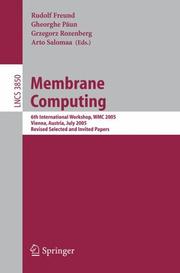
ISBN: 9783540309482 3540309489 3540323406 Year: 2006 Publisher: Berlin ; New York : Springer,
Abstract | Keywords | Export | Availability | Bookmark
 Loading...
Loading...Choose an application
- Reference Manager
- EndNote
- RefWorks (Direct export to RefWorks)
Molecular computers --- Ordinateurs moléculaires --- Congresses. --- Congrès --- Computer Science --- Engineering & Applied Sciences --- Computer science. --- Computers. --- Mathematical logic. --- Computer simulation. --- Bioinformatics. --- Computer Science. --- Theory of Computation. --- Computation by Abstract Devices. --- Mathematical Logic and Formal Languages. --- Simulation and Modeling. --- Bio-informatics --- Biological informatics --- Biology --- Information science --- Computational biology --- Systems biology --- Computer modeling --- Computer models --- Modeling, Computer --- Models, Computer --- Simulation, Computer --- Electromechanical analogies --- Mathematical models --- Simulation methods --- Model-integrated computing --- Algebra of logic --- Logic, Universal --- Mathematical logic --- Symbolic and mathematical logic --- Symbolic logic --- Mathematics --- Algebra, Abstract --- Metamathematics --- Set theory --- Syllogism --- Automatic computers --- Automatic data processors --- Computer hardware --- Computing machines (Computers) --- Electronic brains --- Electronic calculating-machines --- Electronic computers --- Hardware, Computer --- Computer systems --- Cybernetics --- Machine theory --- Calculators --- Cyberspace --- Informatics --- Science --- Data processing --- Information theory. --- Communication theory --- Communication --- Machine theory. --- Formal Languages and Automata Theory. --- Computer Modelling. --- Abstract automata --- Abstract machines --- Automata --- Mathematical machine theory --- Algorithms --- Logic, Symbolic and mathematical --- Recursive functions --- Robotics
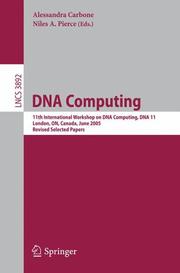
ISBN: 9783540341611 3540341617 354034165X Year: 2006 Publisher: Berlin : Springer,
Abstract | Keywords | Export | Availability | Bookmark
 Loading...
Loading...Choose an application
- Reference Manager
- EndNote
- RefWorks (Direct export to RefWorks)
Molecular computers --- Ordinateurs moléculaires --- Congresses. --- Congrès --- Computer Science --- Engineering & Applied Sciences --- Computer science. --- Computers. --- Algorithms. --- Artificial intelligence. --- Bioinformatics. --- Computational biology. --- Computer Science. --- Computation by Abstract Devices. --- Algorithm Analysis and Problem Complexity. --- Artificial Intelligence (incl. Robotics). --- Computer Appl. in Life Sciences. --- Biology --- Bioinformatics --- Bio-informatics --- Biological informatics --- Information science --- Computational biology --- Systems biology --- AI (Artificial intelligence) --- Artificial thinking --- Electronic brains --- Intellectronics --- Intelligence, Artificial --- Intelligent machines --- Machine intelligence --- Thinking, Artificial --- Bionics --- Cognitive science --- Digital computer simulation --- Electronic data processing --- Logic machines --- Machine theory --- Self-organizing systems --- Simulation methods --- Fifth generation computers --- Neural computers --- Algorism --- Algebra --- Arithmetic --- Automatic computers --- Automatic data processors --- Computer hardware --- Computing machines (Computers) --- Electronic calculating-machines --- Electronic computers --- Hardware, Computer --- Computer systems --- Cybernetics --- Calculators --- Cyberspace --- Informatics --- Science --- Data processing --- Foundations --- Computer software. --- Artificial Intelligence. --- Data processing. --- Software, Computer --- Bioinformatics . --- Computational biology . --- Theory of Computation. --- Computational and Systems Biology.
Book
ISBN: 9783540773115 3540773118 3540773126 Year: 2007 Publisher: Berlin, Heidelberg : Springer Berlin Heidelberg : Imprint: Springer,
Abstract | Keywords | Export | Availability | Bookmark
 Loading...
Loading...Choose an application
- Reference Manager
- EndNote
- RefWorks (Direct export to RefWorks)
This volume contains a selection of papers presented at the Eighth Workshop on Membrane Computing, WMC8, which took place in Thessaloniki, Greece, during June 25–28, 2008. The ?rst three workshops on membrane computing were organized in Curtea de Arge¸ s, Romania – they took place in August 2000 (with the proceedings published in Lecture Notes in Computer Science, volume 2235), in August 2001 (with a selection of papers published as a special issue of Fundamenta Informaticae, volume 49, numbers 1–3, 2002), and in August 2002 (with the proceedings published in Lecture Notes in Computer Science, volume 2597). The next four workshops were organized in Tarragona, Spain, in July 2003, in Milan, Italy, in June 2004, in Vienna, Austria, in July 2005, and in Leiden, The Netherlands, in July 2006, with the proceedings published as volumes 2933, 3365, 3850, and 4361, respectively, of Lecture Notes in Computer Science. The 2007 edition of WMC was organized by the South-East European - search Centre in Thessaloniki, under the auspices of the European Molecular Computing Consortium (EMCC). Special attention was paid to the interaction of membrane computing with biology and computer science, focusing on the biological roots of membrane computing, on applications of membrane computing in biology and medicine, and on possible electronically based implementations. The pre-proceedings of WMC8 were published by the South-East European Research Centre, Thessaloniki, and they were available during the workshop. Each paper was refereed by two members of the Program Committee.
Molecular computers --- Membrane switches --- Ordinateurs moléculaires --- Congresses. --- Congrès --- Computer Science --- Engineering & Applied Sciences --- Computer science. --- Computers. --- Mathematical logic. --- Computer simulation. --- Bioinformatics. --- Computer Science. --- Theory of Computation. --- Computation by Abstract Devices. --- Mathematical Logic and Formal Languages. --- Simulation and Modeling. --- Computational Biology/Bioinformatics. --- Bio-informatics --- Biological informatics --- Biology --- Information science --- Computational biology --- Systems biology --- Computer modeling --- Computer models --- Modeling, Computer --- Models, Computer --- Simulation, Computer --- Electromechanical analogies --- Mathematical models --- Simulation methods --- Model-integrated computing --- Algebra of logic --- Logic, Universal --- Mathematical logic --- Symbolic and mathematical logic --- Symbolic logic --- Mathematics --- Algebra, Abstract --- Metamathematics --- Set theory --- Syllogism --- Automatic computers --- Automatic data processors --- Computer hardware --- Computing machines (Computers) --- Electronic brains --- Electronic calculating-machines --- Electronic computers --- Hardware, Computer --- Computer systems --- Cybernetics --- Machine theory --- Calculators --- Cyberspace --- Informatics --- Science --- Data processing --- Information theory. --- Communication theory --- Communication --- Machine theory. --- Formal Languages and Automata Theory. --- Computer Modelling. --- Computational and Systems Biology. --- Abstract automata --- Abstract machines --- Automata --- Mathematical machine theory --- Algorithms --- Logic, Symbolic and mathematical --- Recursive functions --- Robotics
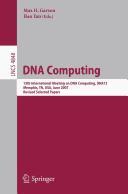
ISBN: 9783540779612 3540779612 3540779620 Year: 2008 Publisher: Berlin, Germany ; New York, New York : Springer,
Abstract | Keywords | Export | Availability | Bookmark
 Loading...
Loading...Choose an application
- Reference Manager
- EndNote
- RefWorks (Direct export to RefWorks)
Biomolecular/DNA computing is now well established as an interdisciplinary field where chemistry, computer science, molecular biology, physics, and mathematics come together with the common purpose of fundamental scientific understanding of biology and chemistry and its applications. This international meeting has been the premier forum where scientists with different backgrounds and a common focus meet to present their latest results and entertain visions of the future. In this tradition, about 100 participants converged in Memphis, Tennessee to hold the 13th International Meeting on DNA Computing during June 4–8, 2007, under the auspices of the International Society for Nanoscale Science, Computation and Engineering (ISNSCE) and The University of Memphis. The call for papers encouraged submissions of original, recent, and promising experimental and theoretical results in the field. The Call for Papers elicited some 62 submissions, almost perfectly balanced among the major theoretical and experimental categories. It is evidence of how well the interdisciplinary nature of the conference has truly matured that the major criterion of quality, agreed upon in advance by the Program Committee (PC), produced a nearly balanced program as well across the two major categories, full papers and talks with an abstract only. The program with the greatest perceived impact consisted of 24 papers for plenary oral talks; in addition, 15 full-paper posters and 10 poster abstracts were accepted, of which 5 authors were invited to give five short demos in a new submission category this year. The conference program retained the structure now customary for this meeting.
Molecular computers --- Ordinateurs moléculaires --- Congresses. --- Congrès --- Computer Science --- Engineering & Applied Sciences --- Computer science. --- Computers. --- Algorithms. --- Artificial intelligence. --- Bioinformatics. --- Computer Science. --- Computation by Abstract Devices. --- Algorithm Analysis and Problem Complexity. --- Computational Biology/Bioinformatics. --- Artificial Intelligence (incl. Robotics). --- Bio-informatics --- Biological informatics --- Biology --- Information science --- Computational biology --- Systems biology --- AI (Artificial intelligence) --- Artificial thinking --- Electronic brains --- Intellectronics --- Intelligence, Artificial --- Intelligent machines --- Machine intelligence --- Thinking, Artificial --- Bionics --- Cognitive science --- Digital computer simulation --- Electronic data processing --- Logic machines --- Machine theory --- Self-organizing systems --- Simulation methods --- Fifth generation computers --- Neural computers --- Algorism --- Algebra --- Arithmetic --- Automatic computers --- Automatic data processors --- Computer hardware --- Computing machines (Computers) --- Electronic calculating-machines --- Electronic computers --- Hardware, Computer --- Computer systems --- Cybernetics --- Calculators --- Cyberspace --- Informatics --- Science --- Data processing --- Foundations --- Computer software. --- Artificial Intelligence. --- Software, Computer --- Theory of Computation. --- Computational and Systems Biology.
| Listing 1 - 9 of 9 |
Sort by
|

 Search
Search Feedback
Feedback About UniCat
About UniCat  Help
Help News
News